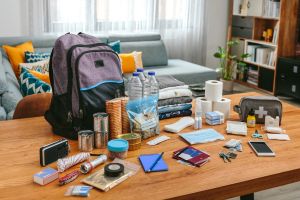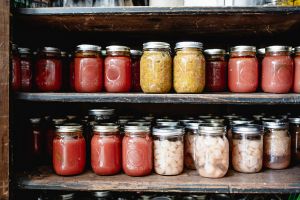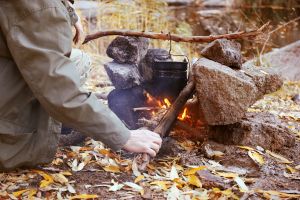![]()
We live in a world now where an increasing number of people are calling themselves preppers and stockpiling for a major disaster scenario.
Just a few years ago, to most people being a ‘prepper’ meant being crazy and neurotic.
But those days are long past.
The Covid pandemic woke many people up to the stark reality that our world is not as stable as it seems. Several incidents of societal unrest, heightened political tensions, wars in other countries, supply chain issues, and an unstable economy have also played a role in convincing many people to set aside provisions for an end of the world disaster.
If you’re one of these people who’s decided that making preparations for a major disaster is wise, and if you’re just getting into prepping, it’s easy to make mistakes right off the bat.
As a prepper with over ten years of experience myself, I’m going to tell you what I wish I had known when I first got into prepping.
Have a Plan
As simple as it sounds, the number one thing I wish I had known when I got into prepping was to have a plan.
 Most people don’t understand preppers or what prepping really is. That’s why when they first decide to start prepping, they do so without having any plan at all.
Most people don’t understand preppers or what prepping really is. That’s why when they first decide to start prepping, they do so without having any plan at all.
They get excited about prepping and to start buying gear and stockpiling supplies such as food, ammunition, and so on without any plan at all.
But do you know how to store your food properly so that it lasts? Have you calculated how much you should store to ensure that you and your family can stay fed for a length of time (such as six months)?
Do you know when you should rotate out your water storage? Do you know how to store your ammunition so that it won’t corrode? Do you know how to use all the gear that you’ve bought?
Simply buying a lot of food and water on its own is not going to prepare you well enough for an end of the world scenario. There’s a lot more you need to do in regards to planning.
Prepping is a lifestyle. A significant part of your life is going to revolve around stockpiling, preparing food to make it longer lasting, rotating out food and water that goes bad, working on your skills, and so on.
This is precisely what most people (potentially including your own family members) do not understand about prepping. They don’t anticipate just how much work and preparation it’s going to require out of their day. True preppers are those who do understand how much work and planning goes into prepping and spend a consistent part of their lives revolving around it.
To that end, you should:
Plan Out What You Will Store
 Don’t just store food and water randomly.
Don’t just store food and water randomly.
Instead, think about how much food and water your family needs on a daily basis, and then work to store enough for the period of time you want to be prepared for.
Let’s say that you want to store enough food and water to last you and your family of four for six months.
Have you actually thought about how much you’ll need to last your family for this long?
In general, it’s wise to set aside the gallon of water per person per day, with this water to be used for both cleaning and drinking purposes. That means you’ll need four gallons of water set aside for a day.
For a week, you’ll need twenty eight gallons. For a month, you’ll need approximately eight hundred and forty gallons. For six months, you’ll need a whopping five thousand gallons of water.
That’s a lot of water, and storing it will be no easy feat either. You would need five 1,000 water harvesting tanks to do it (there are also harvesting tanks with larger capacities, but you get the idea), and then you would need to make sure that you have enough space for those tanks.
You can adopt a similar approach to storing your food as well: think carefully about how much food you and your family will realistically need, and then make sure you have enough space for storing all of that food.
There’s one more step you’ll need to follow here as well…
Rotate
 If you’re going to stockpile food and water, you’ll need to get prepared to rotate that food in a few months (or years) depending on when it goes bad.
If you’re going to stockpile food and water, you’ll need to get prepared to rotate that food in a few months (or years) depending on when it goes bad.
Most food has a limited shelf life, which is why you’ll want to check and rotate your food and water to ensure that it is always safe to consume.
Related: If You Have This in Your Pantry, Throw It Away Immediately
My advice is to put a label on your food and water that indicates the date you stored it. Rotate out the water once every six months, and rotate out the food depending on when it will become perishable (you’ll need to thoroughly research the shelf life of each of each item you store).
Practice Your Skills
There’s an old saying that practice makes perfect. You never want a true survival or grid down disaster to be the first time you put your skills to the test. Rather, you want your skills to be well-honed by the time a major disaster has occurred.
I would focus on practicing the following kinds of skills:
- First Aid Skills
- Food Preservation (canning, freeze drying, curing, etc.)
- Gardening
- Navigation
- Wilderness Survival Skills (building a shelter, building a fire, etc.)
 Simply reading an article on the above kinds of skills doesn’t make you skilled in them.
Simply reading an article on the above kinds of skills doesn’t make you skilled in them.
You’ll need to learn how to can or freeze dry food and practice it in your kitchen, and go out into the woods to build shelters. Go out and try to cook your food off the grid, over an open fire.
Have a Community
There’s another old saying that there is strength and safety in numbers. You and your family simply won’t be able to go it alone when a major disaster strikes. It’s vitally important that you have other people of a similar mindset to you who you can join forces with.
Working together with people, you can teach each other skills, keep track of how much you store, and have a plan for how you will band together and stay in communication for the day when society collapses.
Keep Yourself Under the Radar
In the process of forging a community with other like-minded people, you’ll also want to make sure that your own preparations remain largely unknown by other people. In other words, don’t go around announcing that you are a prepper or talking about your preparations with other people.
It’s certainly okay to talk about prepping with other people. This will be one way that you find other like minded people in the first place.
I’m just saying that I wouldn’t go too far and reveal how much food and water I’ve stored and other preparations I’ve made. When a true disaster strikes, people will get desperate and remember what you said, and they’ll be the ones who come knocking at your door.
Having a plan in regards to how I store my food and water, focusing more on practicing my skills, and finding other trustworthy people in my area who recognize the importance of prepping to join forces are the three primary things I wish I had known when I first started prepping.
Prepping is not about just buying cool gear, stockpiling a few essentials, and thinking you’re going to go it alone when the time comes.
Rather, prepping needs to become a part of your lifestyle where you need to think realistically about how much you want to store and how you should store it, how you can align yourself with other like-minded people, and how you can really develop your skills.
You may also like:
 18 Vintage Homesteading Tools to Search for at Garage Sales
18 Vintage Homesteading Tools to Search for at Garage Sales
They Should Teach THIS in Schools (Video)
Prepping Items FEMA Will Confiscate When SHTF
How Far Away Would You Need to Be to Survive a Nuclear Blast?



